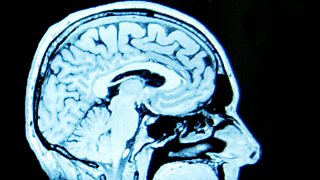Six Mind Myths
Despite the human brain having been studied for centuries, the truth is that we still know very little about the most intelligent super computer known in our universe. The complexity of this organ has resulted in myths about the brain becoming all too common.
In the run up to the premiere of Tracks: Indigo on 28 October, you can now listen to all three previous series of Matthew Brighton's thriller about the human brain on BBC Sounds. To celebrate, we’ve put together a list of six mind myths. It turns out that you are not actually a logical left-brained thinker who performs better under pressure. Sorry to break the bad news…

1. You use just 10% of your brain
A simple MRI scan can quash this theory; scientists have proved that we use more than 10% of our brains tackling even the ‘simplest’ tasks, such as speaking. The origin of the myth may have stemmed from William James’s classic work The Energies of Men (1908) in which the psychologist states that we only harness a small part of our mental ability; however, he did not quote a specific percentage.

Another theory of why this medical myth has become so notorious, may be down to our lack of understanding of the complex subject of neuroscience. Neurons in the brain (grey matter) provide the brain with its processing power and account for one in every ten brain cells. The brain’s other cells – known as glial cells (white matter) - are supportive and give nutrition to the neurons, but they don’t provide any processing power. The theory that it may be possible to harness the glial cells and enable them to perform the processes of neurons is pure fantasy. So remember - if somebody tells you to use all of your brain - reply smugly that you are… – although that might be less convincing if you’re doing something stupid, like putting the milk in the cup BEFORE taking the tea bag out!
2. You can learn languages in your sleep

For those of you who’ve sat in a French language class, awkwardly reciting the sentences of Jean Pierre asking for directions to the local library or ordering a croissant, it’s tempting to believe listening to French language CDs whilst in the land of nod will turn you into a linguistic expert
The effectiveness of acquiring language while sleeping has been widely disputed ever since the contradictory experiment of Charles Simon and William Emmons (1956) found no evidence to support the theory that it’s possible to learn anything whilst dreaming. But further studies by Thomas Schreiner and Björn Rasch (2014), among others, found that exposing test subjects to Dutch vocabulary during non-rapid eye movement sleep or during active or passive waking, improved participants’ ability to recall Dutch words in subsequent language lessons, although only by a small margin. Unfortunately this means that you’re still going to be awkwardly stringing together sentences of foreign lingo - phrase book in hand – on that summer trip to Corsica.
3. Listening to Mozart improves a child's intelligence
‘The Mozart effect’ was a term that evolved from a paper published by the University of California in 1991 which detailed a study of 36 students. Subjects who listened to Mozart for 10 minutes prior to engaging in a mental task - aimed at testing a specific visual spatial skill - performed better than those who sat in silence.

Despite the obvious problem with the size of the survey – which contained no participants that were children - the results inspired a surge in products aimed at parents and marketed at having the potential to increase their children’s intelligence. In 2010, a larger meta-analysis of multiple studies established that listening to music or spoken word could have a short-term impact on the ability to manipulate shapes mentally, but there was no evidence to support sustained impact on IQ.
4. You are a left or right brain thinker
If you believe that you’re a logical left-brainer or an intuitive right-brainer, we hate to be the ones to burst your bubble! That’s not to say that you’re not a logical person but the theory that it’s predominantly one side of the brain that has a significant bearing on your personality is simply a myth. It is true to suggest that some brain functions have more of a bearing on a certain side of the brain: an example is language, which is predominantly controlled in the left side of the brain. However, aspects of communication such as word emphasis and voice modulation are controlled by areas in the right of the brain, so having even a simple conversation provokes complex reactions from both sides.
Modern technology has presented us with a more accurate alternative view in contrast to historic beliefs. A University of Utah study, published in the journal PLOS ONE, scanned each pair of 7266 regions of the brain in over 1000 subjects as they were completing small tasks. The study found no clear evidence to suggest that participants were strongly left or right-lateralized. As humans, we have tendencies to group objects or people into brackets or categories to help us organise and understand the unknown – it’s this human tendency which may also have had an influence into why such a flagrant myth is so popular.
5. Alcohol kills brain cells

Waking up with a pulsating head after the quick post-work glass of Sauvignon Blanc turned into a bottle may give the impression that you’ve destroyed hundreds of billions of brain cells – but good news, you probably haven’t. A study by Grethe Jensen (1993) compared the neurons in matched samples of non-alcoholics and alcoholics - the results showed no noticeable difference in the number or density of brain cells.
However, before you run to the nearest pub to celebrate the news, research suggests that although alcohol may not kill cells, it can have a negative impact on their behaviour; altering the links between neurons in the brain, which effects the way cells communicate with each other. A further study in the journal, Neuroscience, also found moderate amounts of alcohol alters the production of new neurons in the adult hippocampus (a process called neurogenesis) which can have an effect on learning and memory.
6. Brain damage is always permanent
We are often told that brain damage is permanent, but the remarkable thing about this organ is that in certain circumstances it is possible to recover from injury to it - depending on the location and severity of the damage. A concussion can be a temporary disruption to the functions of the brain but, providing there are no subsequent head traumas, the brain can make a full recovery. The brain can also adapt to even more serious injuries in a term called Neuroplasticity. This is the process which refers to the brain’s ability to reroute it's functions disabled by more serious conditions, such as a stroke.
Even so, we wouldn’t recommend spontaneous clifftop sea diving…
Listen to Tracks
-
![]()
Listen to Tracks
Hear the entire box set of Tracks series 1-3 now on BBC Sounds.
-
![]()
The Evolution in Fiction Quiz
How much do you know about evolution in film, TV and literature?
-
![]()
The conspiracy theorist quiz
There are many conspiracy theories waiting for your adoption. But how susceptible are you?
-
![]()
Eight surprising facts about human evolution
How much do you really know about our species?




